If you suffer from hereditary hair loss, you do not necessarily have to be satisfied with the full blown head: Remedies with minoxidil have already helped many people to stop hair loss and to grow new hair. However, you should be aware of a few side effects of minoxidil.
To avoid the side effects ofMinoxidilTo better understand and weigh up, let's first take a look at the active ingredient:
What is Minoxidil
The story is somewhat reminiscent of the invention of Viagra:
The idea behind Minoxidil was initially that it lowers high blood pressure: administered as a tablet, Minoxidil relaxes the muscles of the vascular walls distant from the heart, so that the blood vessels expand. The blood pressure goes down so Minoxidil is an antihypertensive drug.
As a high blood pressure reducer, it sometimes had the side effect that patients grew more hair. This is how it came to be known as a hair loss remedy:
In 1988, Minoxidil was approved as an anti-hair loss agent. Since 1996 there is no longer a patent on the active ingredient, so that more and more products are allowed to use Minoxidil.
The way Minoxidil works as a hair restorer is very similar to that of high blood pressure:
To treat hereditary hair loss (androgenic alopecia), you apply Minoxidil as a foam or solution to the scalp. There it widens the blood vessels so that the blood flows better and your body can better supply the hair roots with nutrients.
Is Minoxidil Worth It: Does it Really Help
There are positive voices about minoxidil: Many men report that hereditary hair loss has slowed down and that some have even got thicker and denser hair.
A well-known supplier of Minoxidil products has been able to prove in studies that men have already grown 15 additional hair per square centimeter after 8 weeks. After a total of 16 weeks of treatment, it was even more than 20.
Minoxidil helps. But:
Minoxidil only helps if you use it permanently. If you interrupt or end the treatment, the hereditary hair loss will set in as usual and you will lose hair.
So for the full effect you have to use Minoxidil for your entire life. In this case, you have to be prepared for a few possible side effects:
# 1 Possible side effect of Minoxidil: Short-term hair loss
A common side effect of Minoxidil is that you initially lose more hair during the treatment. What sounds strange at first is quite normal in weeks 2 to 6 of treatment and is almost inevitably part of the effect.
The reason: Minoxidil influences the hair growth cycle and sends the hair roots into the growth phase at the same time. This replaces old hair with new one, but it also falls out at first.
The short-term hair loss is therefore more of a sign that the active ingredient is doing its job. In weeks 12 to 16 you should see the first results. Your hair will be thicker.
# 2 Possible side effect of Minoxidil: The price tears a small hole in the account
Minoxidil is not a product that you can use when needed. It is an ongoing treatment that you cannot interrupt or your hair will fall out again.s.
This is noticeable on the account in the long run: A pack of Minoxidil hair foam from a well-known manufacturer costs around 60 euros and should last 12 weeks.
A treatment with Minoxidil costs you 260 euros a year.
That's not a little money when you consider that the treatment can last a lifetime.
# 3 Possible side effect of minoxidil: Your scalp suffers
Specialized hair foams and solutions contain not only minoxidil but also other ingredients including alcohol. And depending on whether there is a good or bad alcohol it will attack your scalp.
In short, Minoxidil treatment can dry out and irritate your scalp.
Reddening of the skin and itching are comparatively common and make the treatment a painful experience. What you can do about it, you will find out in the next section.
(It may also be the case that you are allergic to the hair restorer. In this case, you should speak to a doctor and possibly stop taking minoxidil.)
Soothing Your Scalp: How To Treat Minoxidil Side Effects
In the end, of course, whether you accept the side effects of Minoxidil remains a matter of weighing up. For many men, full hair growth can make it worthwhile to put up with redness and irritation on the scalp.
On the other hand, these Minoxidil side effects on the scalp can alleviate!
It just depends on the right shampoo and the right hair conditioner, which you use in addition to the Minoxidil treatment.
The idea behind it is simple: you supply your stressed scalp with valuable oils and vitamins to inhibit and reduce inflammation.
Ideally, the sober and the appropriate conditioner even support the effect of Minoxidil for fuller hair:
- So canthe shampoo also contain caffeine, sandalore and niacinamide to promote hair growth.
- Of thehair conditioner supports hair density with horsetail and nourishes the scalp with blueberry seed oil and vitamins.
Do you try minoxidil?
Should you treat your hair loss with Minoxidil, we wish you every success and a hairy result! Pay attention to the health of your scalp and prevent skin irritations well.
#treatyourself
Anne

